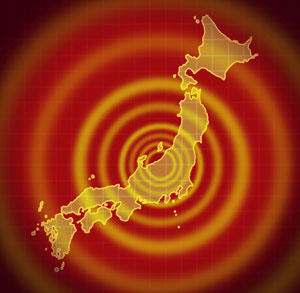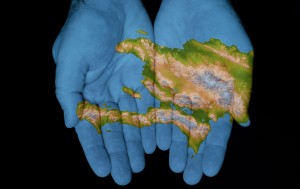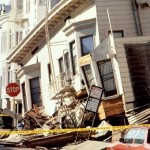Contributed by Scott Mims, Good Shepherd Lutheran Church, Virginia Beach, VA
Warm-up Questions
- What is the most exciting, captivating, or important thing about Easter to you? Why?
- Does your family have any special Easter rituals or traditions? If so, how have these rituals or traditions helped to shape your experience/understanding of Easter and your faith?
Aftershocks
 On March 11, 2001 a massive earthquake struck off the coast of Japan triggering a devastating tsunami that swept over cities and farmland in the northern part of the country. The earthquake, whose magnitude was measured at 9.0 on the Richter scale, is one of the most powerful ever recorded. Adding to the catastrophe, critical cooling systems at the Fukushima Daiichi Nuclear Power Station were severely damaged, triggering explosions, partial core meltdowns, and releases of radioactive material directly into the atmosphere and ocean. In all, over 27,000 people were either killed or are still missing.
On March 11, 2001 a massive earthquake struck off the coast of Japan triggering a devastating tsunami that swept over cities and farmland in the northern part of the country. The earthquake, whose magnitude was measured at 9.0 on the Richter scale, is one of the most powerful ever recorded. Adding to the catastrophe, critical cooling systems at the Fukushima Daiichi Nuclear Power Station were severely damaged, triggering explosions, partial core meltdowns, and releases of radioactive material directly into the atmosphere and ocean. In all, over 27,000 people were either killed or are still missing.
A month later, the aftershocks continue. On April 11, a magnitude 7.1 earthquake—just one of hundreds of smaller, related quakes—rattled the northeastern coast of Japan triggering tsunami warnings and renewed fears. Not all of the “aftershocks” have been physical, however. From the sheer effects of this event in human terms, to falling stock markets, the loss of production from the world’s third largest economy, and the renewed concerns about the safety of nuclear power, the impact of this disaster is being felt the world over…and will be for a long time to come.
Discussion Questions
- Do you know anyone who has either personally been affected by this event, or who knows someone who has been affected? If so, what has this experience been like for them?
- What fears, issues, questions, or concerns – if any – does this event, or similar disasters, raise for you?
- How connected do you feel to events that are happening in other parts of the country or in the world? Do you think what happens to other people, perhaps even people who live thousands of miles away, impacts your life?
- Does the way that you live your life impact the lives of others? How so?
Scripture Texts (NRSV) for Sunday, April 24, 2011 (Resurrection of Our Lord)
Acts 10:34-43
Colossians 3:1-4
Matthew 28:1-10
(Text links are to Oremus Bible Browser. Oremus Bible Browser is not affiliated with or supported by the Evangelical Lutheran Church in America. You can find the calendar of readings for Year C at Lectionary Readings.)
For lectionary humor and insight, check the weekly comic Agnus Day.
Gospel Reflection
We come today to the very epicenter of our Christian faith. Everything that we do as Christians, from our worship life, to our evangelism and service, to the promise of God’s love and grace which sustains us, is rooted in Jesus’ resurrection. This is ground zero. Without the resurrection, Jesus’ death on a Roman cross would have been a tragedy at best. Yet in the resurrection, we see God’s affirmation of who Jesus is as Lord and Savior; in the resurrection we see God’s ultimate victory.
Yet, it is important to remember that, even though Jesus had tried to prepare his disciples and friends, the resurrection was initially a tremendous surprise! Matthew, like all of our gospel writers, tells of certain women coming to the tomb of Jesus early, “as the first day of the week was dawning.” Having seen Jesus laid to rest on Friday, they are coming expecting that the tomb would be occupied. It was a Jewish custom in that day to watch the tomb until after the third day in order to make sure premature burial had not taken place. Perhaps they were approaching Jesus’ well-guarded burial place as early after the Sabbath as they dared in order to offer this last act of devotion. What they encountered shook them to the core, turning their world upside down.
“And suddenly there was a great earthquake; for an angel of the Lord, descending from heaven, came and rolled back the stone and sat on it.” Matthew’s account leaves no doubt as to who is ultimately behind the empty tomb. While the other gospels have the women wondering who has already rolled away the stone, there is nothing ambiguous in this week’s gospel. From the shaking ground, to the blazing angelic messenger, to the guards fainting away from fright, we know that it is none other than God who is at work here. And though the angel’s message fills them both with fear and great joy, it is their encounter with the Risen Christ that convinces them that things would never be the same!
And of course, things haven’t been the same. The earthquake in today’s gospel underscores Jesus’ resurrection as an apocalyptic, world-changing event. It is an event whose aftershocks continue even today as hundreds of millions of people worldwide proclaim with great joy, “Alleluia! Christ is risen! He is risen indeed, alleluia!”
Discussion Questions
- How do you think you might have reacted had you been with the women on that first Easter Sunday? What might it have felt like to encounter Jesus as they did?
- What difference does it make that God raised Jesus from the dead?
- What difference does Jesus’ resurrection make to you personally?
- The earthquake that struck Japan and its aftershocks are forces of devastation. In what ways are the “aftershocks” of the resurrection forces for healing and life? Or put another way, in what ways does our faith lead us to impact our world for God’s glory and for good?
Activity Suggestions
Bible Study: As a group, consider the question: “Does the fact that the tomb was empty necessarily mean that Jesus was resurrected?”
- See if your group can come up with other possibilities. Several that have been suggested include: the women went to the wrong place, Jesus wasn’t really dead and somehow revived and escaped, the disciples stole the body, someone else (the Jewish or Roman authorities) stole the body.
- Dig deeper into the gospel. Beginning with the Crucifixion in Matthew 27: 32 and going through Matthew 28:15, what are the aspects of the story that would make these other possibilities highly unlikely?
- What other “evidence” do we have that Jesus is alive and the Resurrection is true?
Service Project: Consider how your group might be an “aftershock” of God’s victory and life during the 50 days that make up the Easter Season. Could you organize an event or service project to raise money for victims of earthquakes, floods, or other natural and man-made disasters? Is there an opportunity or need in your local community that your group can help address as a way of witnessing to the gospel?
Closing Prayer
Gracious and loving God, we are mindful today of all who suffer, and especially of those who are most vulnerable and in need. Through your Spirit, let the power and promise of the Resurrection take root in our lives, that we may live as vibrant and faithful witnesses to your love; through Jesus Christ, our Risen Lord. Amen!


 California will probably experience a strong earthquake in the future because of movement in the earth’s crust. The
California will probably experience a strong earthquake in the future because of movement in the earth’s crust. The